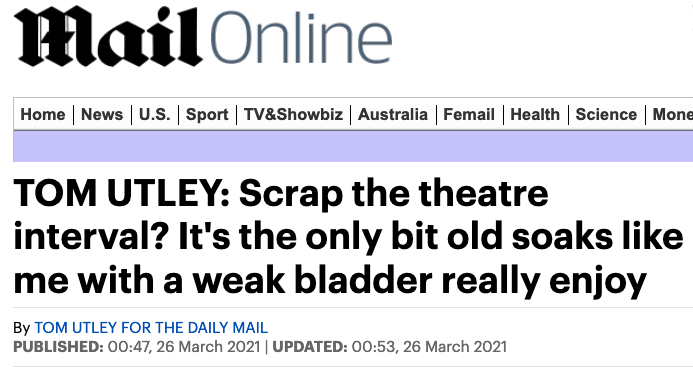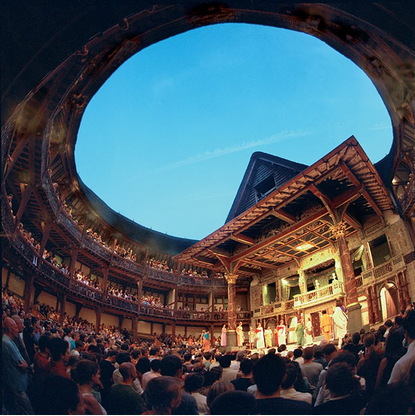I’m not sure that I should even dignify such attacks with a response, but I never quite understand the wholehearted loathing of theatre — and often of musical theatre — that columnists and commentators in the national media regularly trot out as a badge of perverse pride.
And of course, it is also click-bait, as it is bound to get a heated response from those, like me, who want to defend their more outrageous claims against it. Not least today, which also happens to be World Theatre Day.

The latest was in yesterday’s Daily Mail, where Tom Utley, with mock-sheepishness, proclaimed,
“Here’s an embarrassing confession — and I fear that I’ll never be admitted to polite society again once it’s out in the open: reader, I’m not at all keen on live theatre.
Indeed, my heart used to sink before the lockdown on those mercifully rare occasions when kind friends would ring to say they had two spare tickets to whichever show everyone was talking about at the time. Everyone, that is, who had highbrow pretensions.
‘Please say you’ll join us. They say Charles Dance/Judi Dench/Mark Rylance/Ian McKellen [delete as applicable] is absolutely brilliant in it. We thought we’d go out for a meal and make an evening of it’.”
There are two words there that are the giveaway: “highbrow pretensions.”
Somehow, he’s got theatre wrapped up in his mind with elitism and pretentiousness, and worried about things that may go over his aged head, what with his short attention-span and deficient hearing. And the running time may challenge his weak bladder and needs for alcoholic and nicotine reinforcement. And no, I’m not doing as he does throughout the column, which is make assumptions about the sort of things he’s likely to have to endure, but actually drawing on his own stated preferences, deficiencies and shortcomings.
He admits that his favourite bit is the interval.
“I’m not saying that I positively enjoy the experience of queuing up in a massively overcrowded theatre bar to buy a massively overpriced glass of warm white wine between acts.
Nor do I derive any pleasure from overhearing snatches of half-time conversation between fellow audience members, showing off to their friends: ‘Of course, nobody can compete with Gielgud’s sublime performance in ’52…’; ‘She was better as Goneril last year, don’t you think, but then Pirandello is always so much harder to get exactly right…’
No, it’s just the sheer relief, when the lights go up for the interval, of knowing that for a precious 20-30 minutes, I’ll be free to have that drink I yearn for, a cigarette on the street outside, a much-needed pee — and the freedom to cough to my lungs’ content without being scowled at by the lady in the row in front.”
And of course, the thing that has given him material for this column — and after all, that’s the scourge of every columnist, the need to find something to write about every week — was the announcement at Shakespeare’s Globe earlier this week at their season announcement for this summer that they’re scrapping the interval this summer.

Partly that’s part of a plan to bring the running times down to the “two hours traffic of the stage” that Shakespeare himself alludes to, but also so there’s less opportunities for unsafe social mingling. If people need to go to the loo, they just need to get up and go — and as for fears of missing out on important stuff, Michelle Terry, the Globe’s artistic director, said in the press conference, Shakespeare was very adept at making sure you had any information that was essential to understanding his work by repeating it three or four times.
Utley quotes her saying:
“Shakespeare, she reminds us, never wrote with an interval in mind — and his plays ‘work better without them,’ she says.
That’s all very well, perhaps, if you’re a non-smoking teetotaller with a cast-iron bladder, a comfortably-cushioned bottom and an ability to concentrate for hours on end.
But it’s not so great if you’re a chain-smoking old soak like me, with the attention-span of a gnat, a sore rump and a bladder weakened, like his hearing, by the cruel passage of the years.”
But now that Utley has got all that off his chest, I suppose I should thank him for giving me material for this column, in turn.
But why does he even find the need to write it? Nobody is forcing him to go. Not even those well-meaning friends who somehow had a second pair of spares on hand for the latest ‘hot ticket’ that they wanted to invited him to. First of all — and this is a safe assumption — the type of friends who can buy four tickets to a West End play, at current prices, without knowing who they were going to offer them to must be pretty loaded. Tickets are non-refundable and (usually) non-exchangeable — though some of those rules are being relaxed now in the COVID world, for obvious reasons, that infected people should not put others at risk by insisting that they attend.
And for many others that don’t share Utley’s dislike of theatre, he’s actually taking up space that someone else might appreciate a whole lot more. If these tickets are so hard to come by, it’s a pity that they’re being wasted on him.
It turns out, though, that he’s the very worst kind of reluctant theatregoer: the kind that goes only because of the social capital it might earn him. It all becomes clear when he he says how much he loves the experience — if not the actual performances — at Glyndebourne.
“There, whisper it softly, the wining and dining in the interval — ideally on the lawn, on those rare occasions when the rain holds off — is half the point of the experience.
Make that three-quarters of the point. I’d love to pretend I’m a serious opera buff — and I can truthfully say I’ve enjoyed some truly wonderful music there over the past ten years or so, since revered friends took to inviting us every summer before the lockdown struck.
But I’ve never quite shaken off the feeling that the opera itself was the fish paste sandwich we were forced to eat at childhood birthday parties before we could embark on the treats. The interval picnic and the after-show drinks were the jelly and cake.”
So Utley’s piece — designed to diminish the theatre — actually manages to demolish one person only: himself. It tells you so much about him and his priorities. But I’m sure it will resonate with many of his readers. They are, after all, reading the Daily Mail.

